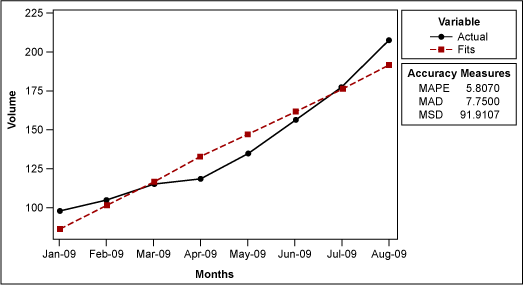Tag: analysis

The Role of X-Bar in Statistics: Understand the Role It Plays in Your Analysis
Published:There are three measures of central tendency for data. One is the mean or x-bar, and the others are the median and mode. When you’re diving into statistical analysis, these are basic components. Most practitioners should have encountered these in grade school, but a refresher never hurts. Let’s dive into what it means. Overview: What […]
Read more »
The Benefits of a Force Field Analysis: Master Changes in Your Processes
Published:One of the most famous sayings in the Star Wars films is May the Force be with you. This saying may also apply to making changes in your organization. Let’s see what forces you need to identify and deal with when using a force field analysis to manage change.
Read more »
Standardized Residuals: Insights into Calculations, Interpretations, and Applications
Published:Residual, standardized residual, studentized residual — what do they mean, and how do I use them?
Read more »
F-value (ANOVA): Get the Most Out of Your Data Analysis
Published:Whether you are talking about the F-value, F-test, F-statistic or F distribution they all revolve around the same concept of using variances to make statistical decisions about your data.
Read more »
Z-Score: A Handy Tool for Detecting Outliers in Data
Published:Some say that Z is the sign of Zorro (Spanish for fox), the fictional sword-wielding masked vigilante who defended and helped the poor. In statistics, it is something different. In statistics, z usually refers to the standardized score or z-score of a data point in a normal distribution. The z-score measures the number […]
Read more »
Exploring the Benefits of Autocorrelation in Time Series Analysis
Published:To optimize the benefit of your forecasting, you would like your time series values to be independent. Unfortunately, sometimes your values are correlated. This autocorrelation will have an impact on your ability to interpret what the data is telling you. Autocorrelation refers to the correlation between a time series variable and its lagged […]
Read more »
Goodman-Kruskal Gamma: A Powerful Tool for Research and Analysis
Published:Correlation allows you to determine whether sets of data have some sort of relationship. Goodman-Kruskal Gamma looks at pairs of data and determines a correlation. Let’s see how.
Read more »
Rounding and Round-off Rules: How It Fits Into Your Data Analysis
Published:When performing statistical data analyses, quality professionals are always challenged to maintain data integrity. When should you round up the answer; when should you round down? How many significant figures are appropriate for the data set that has been taken? Below is a set of simple rules that should help you traverse the […]
Read more »
The Importance of Non-Parametric Tests in Statistical Analysis
Updated:Many statistical tests have underlying assumptions about the population data. But, what happens if you violate those assumptions? This is when you might need to use a non-parametric test to answer your statistical question. Non-parametric refers to a type of statistical analysis that does not make any assumptions about the underlying probability distribution or population […]
Read more »
How the Taguchi Method Simplifies Experimental Design and Analysis
Updated:When you have multiple factors at different levels, it can be challenging to figure out which is the optimal combination. Design of Experiments is one common method you can use. The Taguchi Method is another.
Read more »
What You Need to Know to Calculate CP and Interpret Its Value
Updated:Cp is one of the metrics calculated for determining whether your process is capable of meeting customer specifications or requirements. It is useful in comparing different functions and their ability to meet their unique specifications.
Read more »
Cycle Time vs. Throughput Time: What’s the Difference?
Updated:Cycle time vs. throughput time, do you know the difference? Typically, when we look at the steps of our workflow, you’ll want metrics to gauge effectiveness and efficiency. Depending on the scenario, you’ll want to use one of these two metrics while looking at the work time needed to complete a deliverable. What is Cycle […]
Read more »
B10 Life: Engineering Products for Reliability
Published:As competitive and market pressures increase, having a clear understanding of product reliability, service life, and expected failure rate is crucial. We explore how by utilising B10 life, we can optimise our product development and satisfy our customer requirements.
Read more »
Understanding Exponentially Weighted Moving Average for Time Series Analysis
Updated:Does your data from yesterday represent the current state of your process better than that from a month ago? How can you place more emphasis on it yet still make use of older data? That’s what the Exponentially Weighted Moving Average does.
Read more »
Repeatability vs. Reproducibility: What’s the Difference?
Updated:Repeatability vs. reproducibility, which should you use? Repeatability and reproducibility are two ways that scientists and engineers measure the precision of their experiments and measuring tools. They are heavily used in chemistry and engineering and are typically reported as standard deviations in scientific write-ups. While these two measurements are both used in many types of […]
Read more »
Making Sense of Time Series Forecasting
Published:It is a common scenario: A practitioner has sales data for the past several months and wants to forecast next month’s sales volume. This type of forecasting can help manufacturers and distributors ensure they have enough product to meet customer demands. But how is this forecasting done? Statistical analysis software offers two ways to plot […]
Read more »
MoreSteam.com Receives Patent for EngineRoom Software
Published:Today the U.S. Patent and Trademark Office (USPTO) granted patent rights to MoreSteam.com for inventions developed by MoreSteam’s President, Bill Hathaway.
Read more »
Harnessing the Power of Predictive Analytics
Published:The demand for business intelligence continually increases. Tapping into predictive analytics, a type of data mining that can be used to make reliable predictions of future events based on analysis of historical data, can help.
Read more »
Pareto Principle (80/20 Rule)
Published:Vilfredo Pareto was an economist who is credited with establishing what is now widely known as the Pareto Principle or 80/20 rule. When he discovered the principle, it established that 80 percent of the land in Italy was owned by 20 percent of the population. Later, he discovered that the pareto principle was valid in other parts […]
Read more »
Actionable Information from Soft Data
Published:Engineers, Six Sigma practitioners and other researchers often work with “hard” data – discrete data that can be counted and legitimately expressed as ratios. But what of “soft” data, things like opinions, attitudes and satisfaction? Can statistical process controls (SPC) be applied here? Can process variation in customer satisfaction, for example, be measured and then reported to […]
Read more »
Are You Sure Your Data Is Normal?
Published:Most processes, particularly those involving life data and reliability, are not normally distributed. Most Six Sigma and process capability tools, however, assume normality. Only through verifying data normality and selecting the appropriate data analysis method will the results be accurate. This article discusses the non-normality issue and helps the reader understand some options for analyzing […]
Read more »
Minimize the Risk of the Unknown in Six Sigma Projects
Published:“You don’t know what you don’t know.” That phrase has been taught in Black Belt training for many years, and it continues to be relevant today. When combined with a related phrase, “What you don’t know can hurt you,” these words illustrate a common challenge: Sometimes, the events that hurt us are unknown and unexpected. […]
Read more »
Attribute Agreement Analysis for Defect Databases
Published:A defect database that tracks errors in processes (or even products) – a database that is so sophisticated that it actually tracks where the defect occurred in addition to the type of defect – can provide powerful information. It can be quite helpful in scoping and prioritizing potential improvement opportunities. But is the data trustworthy? […]
Read more »
A Parallel Process View for Information Technology
Published:The value and impact that a solid Design for Six Sigma (DFSS) approach can bring to an IT business is well known. While many organizations understand the relationship between DFSS and their own project management approach, what they often miss is attention to the foundational concepts of Lean and DMAIC (Define, Measure, Analyze, Improve, Control) […]
Read more »